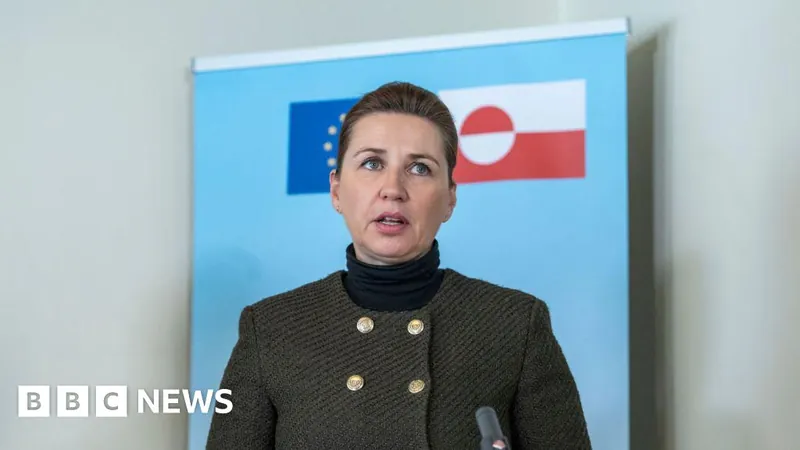
Denmark Faces Uncertainty Amid Trump's Greenland Acquisition Threat
2025-01-09
Author: Emma
Denmark's Political Climate and Trump's Threats
As icy winds sweep through Copenhagen this January, a chill seems to have settled over Denmark's political landscape in response to recent comments from President Donald Trump regarding Greenland. The president's provocative remarks about potentially acquiring the autonomous territory have left Danish leaders grappling with how to react effectively.
"These threats are taken very seriously," stated Foreign Minister Lars Løkke Rasmussen concerning Trump's suggestions about military action and high tariffs if Denmark opposes the acquisition. Yet, he emphasized that the government does not wish to escalate tensions into a conflict.
Reactions From Danish Leaders
Prime Minister Mette Frederiksen attempted to calm the storm, downplaying Trump's military comments by stating, "I don't have the fantasy to imagine that it'll ever come to that." The sentiment among Denmark's business sector echoed this call for calm, with Lars Sandahl Sorensen, CEO of Danish Industry, insisting, "There is no interest in a trade war."
High-Stakes Discussions
However, this rhetoric masks a flurry of high-stakes discussions occurring in the halls of power in Copenhagen. Greenland's Prime Minister Mute Egede ventured to the Danish capital for urgent talks, and party leaders convened in an extraordinary parliamentary session to address the unfolding crisis.
Diplomatic Tightrope
Frederiksen has been navigating a diplomatic tightrope, acknowledging the United States as "Denmark's closest partner" while asserting that the future of Greenland must be determined by its own people. "Greenland belongs to the Greenlanders," she asserted firmly, reflecting a widespread belief that any decision should respect the island's autonomy.
Historical Context and Future Implications
Her cautious approach stems partly from past experiences, particularly when Trump canceled a planned visit to Denmark in 2019 after Frederiksen labeled his proposal to buy Greenland as "absurd." Veteran political analysts worry that such diplomatic missteps could now have lasting consequences, since many suspect this situation might not simply return to normal once Trump leaves office.
Greenland’s Push for Independence
Denmark has a complicated history with Greenland, an area heavily influenced by colonial legacies. Greenland's leadership is increasingly pushing for decolonization and independence, particularly among its younger generations, who are proud of their Inuit heritage. Recent indications from Greenland’s administration suggest that many residents are yearning to sever ties with Denmark entirely, although this desire raises difficult questions about economic stability—Greenland's economy is heavily reliant on Danish subsidies.
Opposition Voices
As Danish political figures contemplate this sentiment, opposition voices are surfacing. Rasmus Jarlov, a member of parliament, criticized Frederiksen's response as insufficiently assertive against Trump's overtures. He expressed concern that the current administration should make a clear stand against any US takeover attempts.
Support From European Leaders
Amid apprehensions over international relations, voices from across Europe have reinforced Denmark’s position. German Chancellor Olaf Scholz and French Foreign Minister Jean-Noël Barrot cautioned that the principle of respecting national borders applies universally—an important reminder during this tumultuous time.
Economic Concerns
Trade experts are equally concerned, projecting that a trade war with the US could cost Denmark significantly. A recent study indicated a potential 3% GDP drop should Trump impose tariffs in retaliation for Denmark's stance on Greenland. With the threat of economic ramifications looming large, Danish industries are bracing for a possible fallout.
A Crossroads of Diplomacy
As Trump’s inauguration draws nearer, Denmark's leadership is left in a precarious state, balancing between diplomatic engagement with the US and protecting Greenland's interests. With continued uncertainty surrounding the administration’s approach to foreign policy, including possible military interventions, Denmark stands at a crossroads—a delicate dance of diplomacy with higher stakes than ever.
Looking Ahead
How this situation unfolds could reshape not only Denmark but also the larger geopolitical landscape of the Arctic region and beyond. As tensions simmer, the question remains: What will Denmark do next in the face of this unprecedented threat?



 Brasil (PT)
Brasil (PT)
 Canada (EN)
Canada (EN)
 Chile (ES)
Chile (ES)
 Česko (CS)
Česko (CS)
 대한민국 (KO)
대한민국 (KO)
 España (ES)
España (ES)
 France (FR)
France (FR)
 Hong Kong (EN)
Hong Kong (EN)
 Italia (IT)
Italia (IT)
 日本 (JA)
日本 (JA)
 Magyarország (HU)
Magyarország (HU)
 Norge (NO)
Norge (NO)
 Polska (PL)
Polska (PL)
 Schweiz (DE)
Schweiz (DE)
 Singapore (EN)
Singapore (EN)
 Sverige (SV)
Sverige (SV)
 Suomi (FI)
Suomi (FI)
 Türkiye (TR)
Türkiye (TR)
 الإمارات العربية المتحدة (AR)
الإمارات العربية المتحدة (AR)